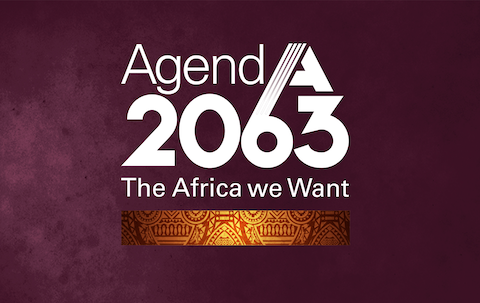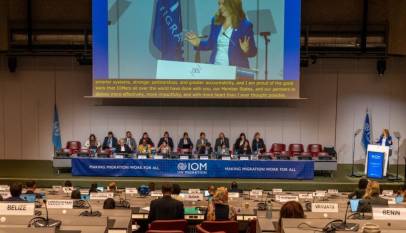REVIEW | 2nd biennial review reveals ‘significant progress’ in Agenda 2063’s implementation
The period 2019 – 2021 saw a substantial headway in the implementation of Agenda 2063, with an overall performance of 51%, against 32% scores in 2019.
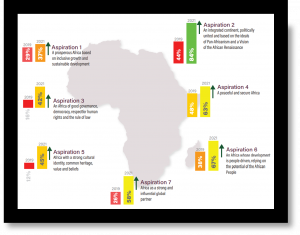
By Adam Alqali
The Second Continental Report on the Implementation of Agenda 2063, the 50-year strategic vision for Africa’s inclusive and sustainable development, reveals a remarkable progress in the continent’s stride towards achieving the much touted Africa We Want, against 2021 projected targets, at national, regional and continental levels.
Agenda 2063 encompasses 7 Aspirations, 20 goals, numerous priorities and 15 flagship projects, planned to be achieved between 2013 and 2063. It is underpinned by the attainment of the Pan African vision of “An integrated, prosperous and peaceful Africa, driven by its own citizens, representing a dynamic force in the international arena.” Thus, the biennial reports are the mechanism for assessing progress in the execution of the Agenda’s segmented Ten-Year Implementation Plans.
Accordingly, the First Ten-Year Implementation Plan (FTYIP) is the initial of a sequence of five ten-year long plans spread over the Agenda’s half-century timespan being implemented over the decade 2014 – 2023. Hence, the second biennial report comes in the build of to the evaluation of Agenda 2063’s FTYIP which is set to commence early 2022 and will be followed by the formulation of the Second Ten-Year Implementation Plan for the 2024 -2033 decade.
The biennial progress report, which covers the period 2019-2021, shows 51% overall performance in Agenda 2063’s implementation, against the 32% overall performance in the First Continental Report on the Implementation of Agenda 2063.Whereas the first progress report analysed data from only 31 out of the 55 AU member states, the second report features reports from 38 countries.
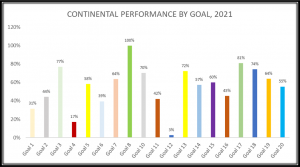
How 7 aspirations, 20 goals fared
According to the report, for Aspiration 1 (A prosperous Africa based on inclusive growth and sustainable development), the continent has progressed from 29% in 2019 to 37% while for Aspiration 2 (An integrated continent; politically united and based on the ideals of Pan-Africanism and the vision of Africa’s Renaissance), Africa almost doubled its tally, from 44% to 84%.
This is just as Aspiration 3 (An Africa of good governance, democracy, respect for human rights, justice and the rule of law) saw a significant progress from a mere 16% to 42%. Moreover, Aspiration 4 (A peaceful and secure Africa) saw a moderate headway – from 48% to 63% – while scores of Aspiration 5 (An Africa with a strong cultural identity, common heritage, values and ethics) had more than tripled from its 2019 value of 12% to 45%.
In the same manner, results of Aspiration 6 (An Africa whose development is people-driven, relying on the potential of African people) almost doubled from 38% to 67% while progress on Aspiration 7 (Africa as a strong, united, resilient and influential global player) more than doubled from 26% to 58%.
Similarly, the individual goals fared differently with goals like Goal 8 [United Africa (federal or confederate)] attaining 100% while Goal 17 (Full gender equality in all spheres of life) scored 81%, just as Goal 3 (Healthy and well-nourished citizens) polled 77%. Contrastingly, Goal 1 (A high standard of living, quality of life and wellbeing for all citizens); Goal 4 (Transformed economies); and Goal 12 (Capable institutions and transformative leadership in place) scored very low, with 31%, 17% and 3%, respectively.
In terms of progress recorded by the five African regions, East Africa is leading the pack with a 53% total in 2021, against 39% in 2019; it is closely followed by Southern Africa which polled 49% against 24% scores in 2019. West Africa came third with 45% scores against 33% in 2019 while Central Africa polled 42% against 25% in 2019, just as North Africa scored 39%, showing a minor progress against its 2019 scores of 36%.
Largely due to the advent of the Covid-19 pandemic in early 2020, the progress report revealed GDP growth rates in Africa to have significantly slowed down to mere 0.7% over the 2-year period. This is significantly below the 2013 reference line of 5.5% and the 2021 projection of 7%. Equally, unemployment rates had worsened from the predicted single digit of 9% to a double digit of 15%, against the 2013 baseline of 11%.
School enrolment is central to economic growth thus the report captured the prevailing school enrolment rates in Africa with primary school enrolment for the period 2019-2021 pegged at 86%, against the estimated 96% and 2013 baseline of 79%. Similarly, secondary school enrolment had barely advanced from the 2013 baseline of 34% to 52%, against the foreseen 87%, just as the proportion of seats held by women across national parliaments, regional and local bodies increased to precisely 28% in 2021, against the anticipated 28%.
The report also highlighted progress in implementation of flagship projects of Agenda 2063, a total of 15 cross-sectoral initiatives recognized by the AU as integral to accelerating Africa’s economic growth and development. They cut across varied sectors, namely infrastructure, education, science, technology, arts and culture as well as peace and security. Among others, they include the African Continental Free Trade Area (AfCFTA); Single African Air Transport Market (SAATM), the Free Movement Protocol (FMP) and the African Financial Institutions.
Among others, the latest review showcases the significant progress recorded in implementing the AfCFTA which thus far has been signed by 54 out of 55 AU member states while 39 member states have ratified it [as at September 2021]. According to the report, 35 member countries have signed the solemn commitment towards full operationalisation of SAATM while only 19 states have fully implemented concrete measures. Also, 33 member states have signed up to the FMP just as barely 4 have ratified the Protocol.
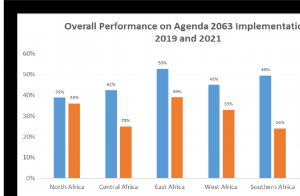
Agenda 2063 in harmony with SDGs – AUDA-NEPAD
Martin Bwalya, acting director for knowledge management and programme evaluation at the African Union Development Agency (AUDA-NEPAD), which produces the biennial reports, while addressing journalists at the Agenda 2063 Media Network’s monthly briefing recently, said the Agenda provides Africa unique opportunity to effectively address its development challenges.
Bwalya however noted that Agenda 2063 was not a standalone framework, rather it enjoys complementarity with the Sustainable Development Goals (SDGs) and was accordingly also domesticated into the National Development Plans (NDPs) of AU member states, adding that the Agenda’s FTYIP was anchored on 4 impact areas, namely: wealth creation; shared prosperity and transformed livelihoods; transformative capacities; as well as environmental sustainability.
“Agenda 2063 came into being before Agenda 2030 and Africa was the only region that [collectively] provided inputs into the formulation of the SDGs; therefore, the 17 goals of Agenda 2030 were heavily influenced by the 20 goals of Agenda 2063. Although there is more being achieved in implementing Agenda 2063, compared to the SDGs, however there is less public and communication campaigns as well as ownership for Agenda 2063,” he decried.
Bwalya nonetheless said the implementation of the Second Ten-Year Implementation Plan for Agenda 2063 would be markedly different from the first, thanks to the various lessons they had learnt from the FTYIP’s implementation. He also noted that Africa was now becoming more assertive in its engagement with other regional groupings and world powers and was accordingly now taking ownership and responsibility over its development agenda.
“This was evident in the continent’s negotiation over the Covid-19 vaccine; we saw a continent that was more assertive and clear [about its priorities]. This also speaks about domestic financing; there is a progression and increased political understanding that we need to finance our own development agenda by putting our money where our mouth is. We can’t continue to blame colonialists and other world powers,” affirmed Bwalya.
Review not independent – Agenda 2063 Academy
Nombulelo Mbokazi, executive director of the Agenda 2063 Academy described as a major weakness the fact that the report draws its principal data and information from member states, RECs and the AU, adding that to ensure a more robust and fair progress report, the review should have been carried out by an independent body which might have taken care of some of its major weaknesses. Also, she said the fact that complete data was in certain cases unavailable meant some of the scores do not paint an accurate picture of progress.
“The reason I’m saying this is because the current cited sources are likely to be biased. For example, Eswatini is described as ‘a model for peace’, yet the country witnessed tragic unrests and violence in 2021. Performance scores are based on the availability of both the base value and current value of the indicators in member states’ data entry template. Where no data has been provided, or data has been entered for only one data point, the analysis considered this as zero performance, which affected overall performance at all levels,” Mbokazi noted.
Conclusions and recommendations
The second biennial report concludes there was an improved harmonisation of policies and regulatory frameworks at regional and continental levels towards better implementation of AU flagship projects. The report reasoned this was owing to increased levels of coherence, coordination and synergies. It however noted the unprecedented socioeconomic challenges caused by the outbreak of the COVID-19 pandemic which reduced fiscal regimes of African governments, putting immense pressure on their health systems.
The report says these unforeseen developments negatively impacted on Agenda 2063’s implementation and therefore, recommended deepening of African citizens’ engagement on the implementation process in order to build ownership. It also called for strengthening of the capacities of member states and Regional Economic Communities (RECs) to develop bankable projects and improve coordination mechanisms; as well as enhancing Domestic Resource Mobilisation (DRM) for the Agenda’s implementation.
Importantly, the biennial report noted that realizing the goals and targets of Agenda 2063 was largely dependent on strong political commitment, along with capable and accountable institutions to support the implementation, monitoring and reporting processes. As the main financier of Africa’s integration, the AU had mandated the African Development Bank (AfDB) to partner states, RECs, development partners, and the private sector to mobilize the resources needed for the implementation.
You can download a copy of the Second Continental Report on the Implementation of Agenda 2063 here

